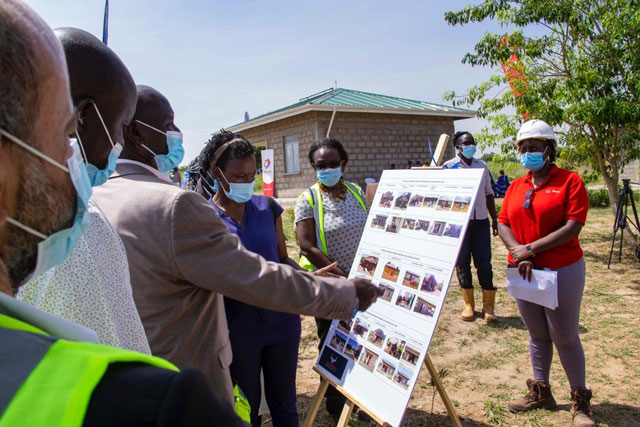
COMMENT | TOM JOSEPH MUKASA | Following the full opening of our economy, one can now say, ‘the year started on a good note.’ But even better is the blessing of the Final Investment Decision (FID) by crucial players TotalEnergies, CNOOC, UNOC and TPDC in our oil and gas sector. It’s now time for more local firms to look for those juicy opportunities in the sector.
Once a Ugandan company bids and wins a contract to provide goods and services in the Oil and Gas sector, the rewards are more than just a good turnover and net profits.
The impact of such a contract encompasses the employees of the entity, the temporary personnel, the suppliers of materials needed, and providers of other services and goods down the value chain.
For example, Pearl Engineering Company Limited, a wholly indigenous company, was contracted by TotalEnergies EP Uganda following a thorough contracting and procurement process to undertake civil engineering works in Tilenga near Lake Albert. The scope includes constructing various access roads that will lead to the oil well pads and industrial areas, in addition to camp expansion and construction.
The company’s staff are 100% Ugandans, while 40 per cent of the personnel employed on these projects are people from the local communities near the project area. Over the years, we have engaged thousands of Ugandans in local communities and nationwide. Many have moved up the ranks to become engineers and are employed in different organisations.
In addition, 99% per cent of materials such as murram, stones, hardcore used in the construction works are all sourced from local communities. The other materials like cement and steel are procured from factories in-country. By the time these works are finalised, a long chain of Ugandan businesses, Ugandan workforce, and Ugandan households will have reaped from the country’s oil and gas resources.
An entry into the Oil and Gas industry is a mixed bag for individual companies. It is a journey characterised by adapting, growth and investment.
In a country like Uganda, whose oil and gas sector is only emerging, local companies will inevitably meet specific challenges due to a lack of exposure and experience. Since 2009 when Pearl Engineering got involved in the oil and gas industry during the exploration activities, our capacity has improved, as we have grown exponentially – thanks to the professional and technical support provided by the oil and gas companies like TotalEnergies EP Uganda, through channels like supplier development forums. We have been supported to acquire certification, including free training in health and safety, environmental management, resource management, to our personnel.
These companies also dedicate expert teams that are always on-site with the contractor’s teams from day one until the completion of the site. In terms of management and supervision capacity, there is a lot of value that comes from this symbiotic relationship.
Participation in the oil and gas fields has been an immense opportunity for a firm like Pearl Engineering, which started as a building contractor specialising in schools, health centres, and administrative buildings in 1994. Our fleet has grown sizeably over the years, and so has the staff. Our turnover has grown from less than one billion a year to Shs.45 billion, at one point. Our evolution from humble beginnings to prominent projects like valley dams and irrigation schemes then oil and Gas comes with many lessons and experiences. It is a story that many other indigenous entities should attest to.
As you would imagine, the impact of oil and gas contracts on any entity’s portfolio cannot be emphasised well enough, as oil and gas is a highly regulated and monitored sector. The level of risk assessment involved in doing such projects is way above what you would expect in an ordinary construction site.
The discipline and efficiency that result from this promote any business’ image to potential customers and boosts its opportunities. There is a lot of emphasis on environmental management, community and social responsibility, mitigating hazards and risks. All these require documented standards.
On their part, companies and suppliers of goods and services must appreciate the uniqueness of oil and gas as an international trade and the demands that it comes with.
As local entities prepare to partake in this industry, they must learn to be as transparent as possible, for these international firms do not like surprises. Luckily, they are always willing to sit with you and find a way out. Once you encounter a challenge, please do not hesitate to seek support (as a stitch in time…) because the longer you sit on a challenge, the more it escalates.
Looking ahead, we continue to hope that the oil and gas activities will create some stability in the construction sector. There will be much more demand for construction services in the next five years, as the rest of the economy will feel the ripple effects.
Strategically, businesses should start preparing for the next ten years – the oil and gas operations phase. By the time the development phase is concluded, we should have attained the discipline and skills for operating and maintaining the oil facilities and, most importantly, fully taken advantage of the business opportunities.
*****
 Tom Joseph Mukasa is the Chief Executive Officer, Pearl Engineering Company Limited
Tom Joseph Mukasa is the Chief Executive Officer, Pearl Engineering Company Limited
 The Independent Uganda: You get the Truth we Pay the Price
The Independent Uganda: You get the Truth we Pay the Price



